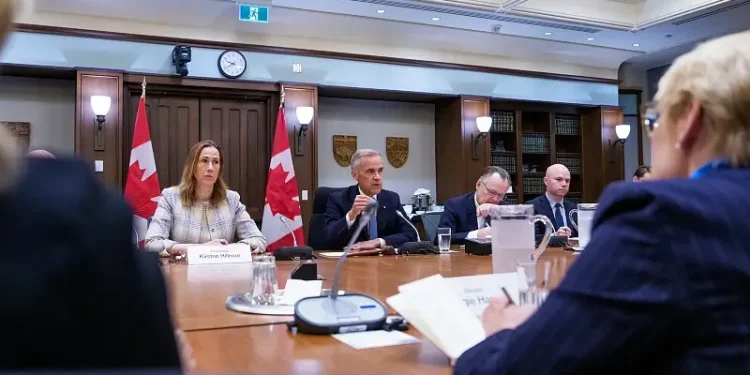A New Chapter in Canada–U.S. Relations
Diplomatic discussions reached a critical juncture last week as Prime Minister Mark Carney welcomed a bipartisan group of U.S. senators to Ottawa.
The meeting focused on the evolving Canada–U.S. trade partnership, border security, and the urgent need to address the fentanyl crisis—a deadly epidemic affecting both nations.
Why This Meeting Mattered
On Canadian soil, senators Ron Wyden (Oregon), Lisa Murkowski (Alaska), Maggie Hassan (New Hampshire), and Catherine Cortez Masto (Nevada) sat down with Prime Minister Carney to reinforce economic ties and strengthen continental security.
This high-level meeting comes at a pivotal moment, as both countries navigate shifting global trade patterns and intensifying cross-border drug trafficking threats.
While previous leaders have tackled similar issues, Carney’s approach is notably comprehensive. It integrates trade modernization, health responses, and defense strategies under one policy umbrella—highlighting a modern vision of bilateral cooperation.
Main Topics on the Table
1. Strengthening Economic Ties
Trade between Canada and the U.S. supports millions of jobs, with Canadian businesses playing a vital role in several U.S. states. During the talks, both sides reaffirmed their commitment to stable trade flows, especially in key sectors like:
-
Manufacturing
-
Energy
-
Forestry
-
Agriculture
Recent economic figures underscore this relationship:
| 2024 Trade Overview | Value (USD) |
|---|---|
| Total Canada–U.S. trade | $762.1 billion |
| U.S. exports to Canada | $349.4 billion |
| U.S. imports from Canada | $412.7 billion |
| Trade deficit (U.S.) | $63.3 billion |
These figures highlight a balanced and deeply integrated trading relationship. Notably, 76% of Canada’s exports head south of the border, and Canadian goods remain essential to the day-to-day lives of Americans—especially in the states represented at the meeting.
2. Tackling the Fentanyl Crisis Together
With opioid overdoses claiming 21 lives daily in Canada, and fentanyl contributing to nearly 80% of these deaths, the crisis is national in scale. Yet, it’s also deeply personal for affected families in communities from Vancouver to Halifax.
The Prime Minister and senators discussed:
-
Increasing surveillance at the Canada–U.S. border.
-
Enhancing cross-border law enforcement cooperation.
-
Expanding support services for affected communities.
Since 2018, Canada has dismantled 44 illicit fentanyl labs and committed over $1.3 billion CAD to new border technology—including drones and detection systems.
While seizures of fentanyl at the northern border remain low (just 26kg in 2025), this meeting underscores the need for vigilance, especially as trafficking routes adapt.
Security, Defence, and Border Policy
Beyond drugs and trade, the group addressed broader security issues. With rising geopolitical tensions and evolving threats—from cybercrime to organized trafficking—Carney emphasized a coordinated approach to continental defense.
This includes:
-
Shared intelligence through a new Canada–U.S. Strike Force.
-
Modernizing border crossings to reduce illegal migration.
-
Emergency preparedness investments in border communities.
As a result of recent policies, illegal border crossings from Canada into the U.S. have dropped by 90% since their 2024 peak. Moreover, irregular asylum claims in Canada have decreased by 77%, reflecting successful policy shifts and improved bilateral enforcement.
Local Stakes and Everyday Impact
These talks weren’t just diplomatic formalities—they directly touch lives in both countries.
For Canadians, the outcomes could affect:
-
Job security in export-heavy industries like steel and agriculture.
-
Border travel for business, tourism, and family visits.
-
Public health resources, especially in areas hit hard by opioids.
And for Americans in Oregon, Alaska, New Hampshire, and Nevada, Canadian economic activity means:
-
Reliable supply chains in energy and raw materials.
-
Cross-border jobs, especially in rural manufacturing.
-
Shared community investments through binational projects.
What This Means for Canadians
Professionals working in law enforcement, logistics, healthcare, and small business should pay close attention. New trade rules, security cooperation, and drug enforcement protocols may soon:
-
Influence operational costs and import/export processes
-
Affect regulatory compliance for cross-border industries
-
Reshape health and safety strategies in communities
For example, small Canadian exporters may benefit from clearer trade protocols, while border town hospitals may receive new support to handle opioid-related health emergencies.
The Takeaway
As negotiations continue in Washington, D.C., and Ottawa, the path forward will require diplomacy, flexibility, and pragmatism. Minister Dominic LeBlanc is expected to build on this momentum in his upcoming talks with U.S. officials.
In the words of one federal advisor, “This is more than just trade—it’s about redefining our partnership in a world that’s changing fast.”
For Canadians, whether raising families, running businesses, or building careers, this evolving relationship with our southern neighbour is more than policy—it’s personal.
Sources: Canadian Prime Minister, US Census Bureau, and BBC News.
Prepared by Ivan Alexander Golden, Founder of THX News™, an independent news organization delivering timely insights from global official sources. Combines AI-analyzed research with human-edited accuracy and context.








